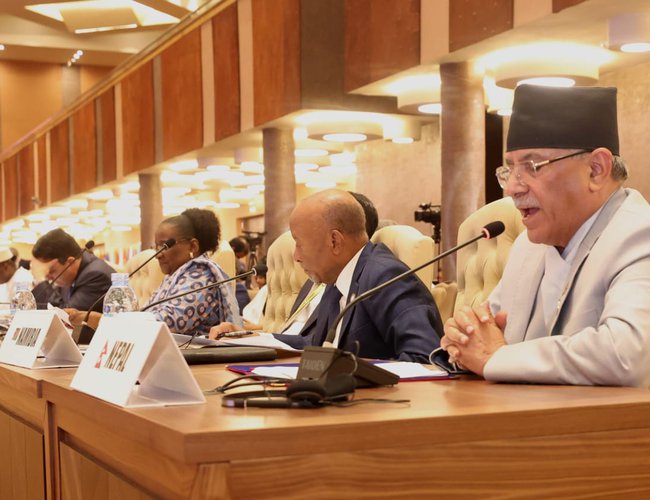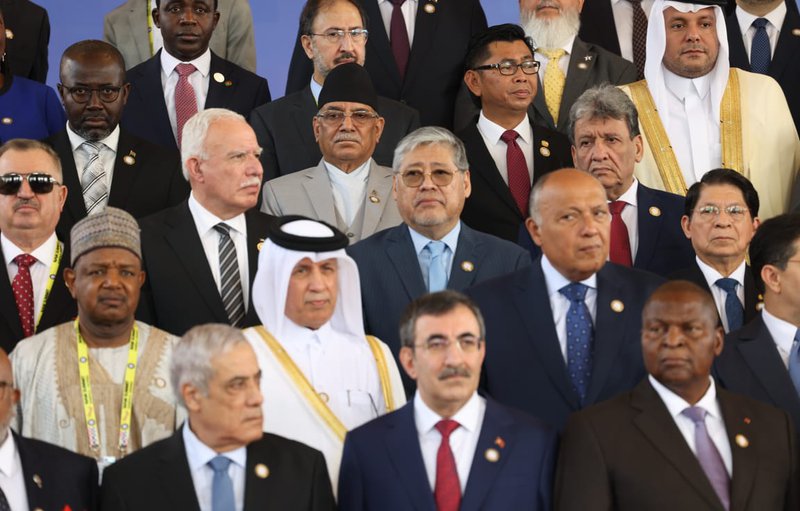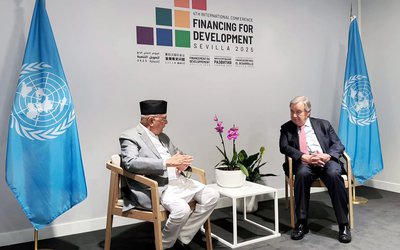
Even after returning from attending the 19th Non-Aligned Summit in Kampala, the capital of Uganda, Prime Minister Pushpa Kamal Dahal Prachanda has made every effort to justify his visit. But his critics are not yet satisfied.
In Nepal, it is a ritual to criticize the leaders who attend such summits. Prime Minister Prachanda is no exception. Nor will he be the last. From the monarch to the present rulers, all of them have faced similar hostile move whenever they make high level visit to international summit.
Attended by over 120 countries, including high-level delegations from multilateral and bilateral agencies, summits such as the Non-Aligned Movement are appropriate venues for the smaller countries to present their views and show their presence.
Despite such a highly relevant forum, Prime Minister Prachanda and his core team could not convince the people about the implications of participation in the national context.
Why NAM Is Important for Nepal
In the words of Dr. Dinesh Bhattarai, a career diplomat and National Foreign Relations Advisor to the late Prime Minister Sushil Koirala, "Non-alignment remains deeply rooted in the defensive values and policies of Nepal's foreign policy. It seeks a rough balance between adversaries and uses it as a diplomatic tool for security, identity, survival and advancement. Non-alignment is a peculiarly Nepali trait that fits well with the nation's need to protect sovereignty and national independence while pursuing development in a policy-centric world order," writes Dr. Bhattarai in his book Non-alignment, Quest for an independent foreign policy.
Published by the Center for Nepal and Asian Studies, Tribhuwan University, Dr. Bhattarai states, "Nepal, sandwiched between two of Asia's colossal powers, India and China, is unable to avoid geographical constraints and reap opportunities. It has strong spiritual, social, economic and cultural ties with them, especially with India. The phrase "a yam between two rocks," coined by the unifier of Nepal, King Prithvi Narayan Shah, has remained the nation's geographical code for its regional and international behavior and strategy not to be overshadowed by its vastness but to find its own path for survival, resilience and progress. The Rana regime also followed the spirit of a Yam, seeking balanced relations with neighbors while trying to diversify relations outside the neighborhood sphere so that the nation's freedom of maneuver is not entirely determined by its neighbors."
Dr. Bhattarai asserts in his book that non-alignment has remained a fundamental basis of Nepal's foreign policy choices in the interstate system ever since. As a sign of solidarity, Nepal's decision to be a founding member of NAM has historical significance.\
Prachanda In NAM
As a founding member of NAM, it is not unnatural for any political leader to attend the summit and show solidarity with the ideology that is the foundation of the country's foreign policy. In this sense, Prachanda's participation in the summit despite the opposition in the country is significant.
"It is a matter of happiness for Nepal to participate in the 19th Non-Aligned Movement (NAM) Summit in Kampala, Uganda, as a founding country. It is of immense importance as the conference has been organized at a time when several problems have come to the fore in the world," said Prime Minister Prachanda.

"The NAM Conference has been organized in the context of geopolitical complexities, the Russia-Ukraine and Israel-Palestine wars, the impact of the COVID pandemic on the global economy, the challenges posed by climate change and the problems faced by the least developed countries. "To address these challenges, NAM should take initiative and leadership. The importance and essence of NAM has further increased than before. "
Nepal is the founding member of NAM. The organization was established in the Bandung Conference in 1955 AD. Since then, Nepal has been playing an active role in NAM. Although the regime has changed as a system, Nepal's commitment to the movement is intact.
In this context, Nepal can continue to play its pivotal role in NAM. NAM should be further strengthened. NAM came into existence under the peculiar circumstances of the Cold War.
"The essence of NAM has been further strengthened in the changed context. It has been realized to make it more effective and empowered. The Non-Aligned Movement should not be seen in the context of the Cold War. Raising voice and struggle against the hegemony of colonialism, neo-colonialism and powerful countries is equally important at the present time. In this context, the essence of NAM has been further strengthened," PM said.
The NAM's founding spirit should be maintained today. Countries should avoid exhibiting a dual policy and make their position clear.
The organization includes over 120 countries, including some developed nations from the third world. If these countries work together in an organized manner, they can contribute significantly to peace, stability, and the future of humanity. This idea was expressed in the commitments made during the NAM Summit.
Nepal, as a member of NAM, has a special responsibility and has fulfilled it by advancing NAM in a strong, integrated, and centralized way. Nepal can take pride in this achievement.
Attending the summit was necessary, but the preparation for the visit did not meet Nepal's standards for continuity with its foreign policy. The prime minister's statement at the summit was inadequate, unlike the statements delivered by the presidents of Venezuela or Cuba.
The PM was surrounded by people ideologically closer to the communist regime, which naturally influenced his statement. However, this could damage Nepal's long-term global interests.
Led by Saud, a young and energetic leader of the Nepali Congress, the Ministry of Foreign Affairs seems to have made no effort to obtain the statement or clarify the wording. The team includes professional and qualified high-level officials such as Secretary Sewa Lamsal and Joint Secretary and Spokesperson Amrit Rai.
Although Prime Minister Prachanda made efforts to correct his statement during the press conference, the damage to Nepal's foreign policy position and stance has already been done. During the Summit, the Prime Minister held bilateral meetings with heads of state, heads of government, and other high dignitaries in attendance.
Nepal is a founding member of the Non-Aligned Movement and has actively participated in all NAM Summits since its inception. During the 19th Summit of the Non-Aligned Movement (NAM) held in Kampala, Uganda, Nepal advocated for the interests of developing nations.
According to Prachanda, Nepal has faced various multidimensional challenges despite its efforts to graduate from a Least Developed Country, making it unlikely to achieve sustainable development goals (SDGs).
The PM emphasized the importance of economic development and prosperity for developing countries to achieve the internationally agreed-upon goals, including the SDGs, Paris Agreement, and others.
In his address to the 19th NAM Summit, the PM urged NAM members to reaffirm their commitment to the values and principles of non-alignment. He called on them to work together with utmost sincerity, harmony, solidarity, and cooperation for our shared affluence. The PM reiterated the need to reinvigorate NAM to make it a force to be reckoned with in building a just, equitable, peaceful, sustainable, and prosperous world, leaving no one behind.
Dr. Bhattarai writes that non-alignment is the cornerstone of the country's approach to balancing its foreign policy objectives. This approach aims to uphold and advance Nepal's national goals of survival, prosperity, stability, status, and international acceptability. The recently concluded summit and Nepal's commitment are highly important.
- MELAMCHI WATER SUPPLY: No Interruption During Monsoon
- Jun 25, 2025
- KOREAN RETURNEES: Successful Integration
- Jun 25, 2025
- UPPER TRISHULI-1: Engaging With Local
- Jun 25, 2025
- IME GROUP: Twenty Five Years Of Journey
- Jun 24, 2025
- NEPAL’S AIR POLLUTION: A Growing Health Concern
- Jun 24, 2025















